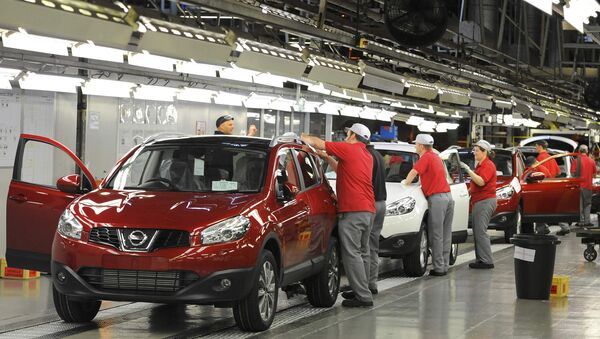In this first release of GDP data covering a full quarter following the EU referendum, comes the surprising news that the UK's economy grew by half a percent. That's despite all the doom-and-gloom forecasting from a plethora of international financial institutions such as the IMF, European Central Bank and the UK's own Treasury, nicknamed Project Fear.
0.5% growth in #GDP in Q3, led by strong growth in services, particularly films, retail and computer programming https://t.co/0fCtmlthvu
— ONS (@ONS) 27 October 2016
The data has been seized upon by pro-Brexit supporters that Prime Minister May's mantra of "We're going to deliver Brexit, and we're going to make a success of it" is on the money.
Certainly the 0.5% figure is higher than the 0.3% of growth that was expected. However, it is less than 0.7% growth, which is what was forecast before the UK voted to leave the EU. Also, the Office for National Statistics (ONS) report breaks down the UK economy's performance by sectors, and there is plenty for Mrs. May to be concerned about.
UK GDP Q3 first estimate is at top end of forecasts, although services industries was the only sector to show growth pic.twitter.com/jf6wQbb4Hu
— James Wells (@ONS_BizPrices) October 27, 2016
It shows that the government's target to diversify the UK economy, to prioritize British manufacturing, rather than being so reliant on services, is not working. Manufacturing in particular is significantly down.
ICT, wholesale & retail and mining & quarrying sectors were the biggest contributors to UK GDP growth in Q3. pic.twitter.com/a8CxsxgWu9
— Rupert Seggins (@Rupert_Seggins) October 27, 2016
Fortunately for the government, the lacklustre manufacturing data has been published on the same day that the Japanese car maker Nissan has announced it will continue to invest in the UK. Nissan's next generation of its Qashqai SUV model will be built in Sunderland, in the north of England.
We ARE going to make a success of Brexit!
— Michael Fabricant (@Mike_Fabricant) October 27, 2016
Nissan not only going to build new Qashqai in Sunderland but X-trail too previously made in Spain
It's a significant boon for Prime Minister May. The move will secure 7,000 jobs at what is Britain's largest car plant. 475,000 vehicles were made in Sunderland last year, equaling a third of all cars manufactured in the UK.
Mrs. May welcomed the news as "a ringing endorsement of Britain" post-Brexit.
"It is a recognition that the Government is committed to creating and supporting the right conditions for the automotive industry so it continues to grow — now and in the future," the prime minister said.
"This vote of confidence shows Britain is open for business and that we remain an outward-looking, world-leading nation. The Government will continue to work closely with employers and investors in creating a global Britain, a country where there are new opportunities for jobs and rewarding careers."
However, Nissan said it authorized the decision after "support and assurances from the UK government." Many were quick to demand to know exactly what Mrs. May promised the Japanese automotive giant in return for their investment.
Welcome news for UK manufacturing but questions remain about what guarantees Nissan received and whether Govt plans to shield other sectors. https://t.co/5R4kuOarWz
— Matthew Pennycook MP (@mtpennycook) October 27, 2016
Nonetheless, the UK economy has now grown for 15 quarters in a row, and is 8.2% higher than before the 2008 financial crisis. However, some economists warn that this resilience can not be expected to hold, as Brexit's many political uncertainties begin to stunt business decisions.
If UK govt really is underwriting tariff loss for companies post #Brexit this takes industrial strategy to whole new level.
— nick tolhurst (@nicktolhurst) October 27, 2016
Foreign direct investment is likely to take a hit, something even Mrs. May suspected before the referendum vote.
If firms postpone investment over the coming quarters, even the drop in sterling could not be enough to buffer even further contractions in UK manufacturing.
UK #GDP was resilient in Q3, led by services. But impact of #Brexit decision on investment still likely to dampen growth next year.
— Andrew Sentance (@asentance) October 27, 2016
The longer the political confusion over the UK's Brexit negotiating position continues, the less likely the next GDP quarter figures will be as positive.


